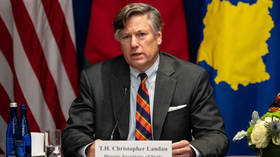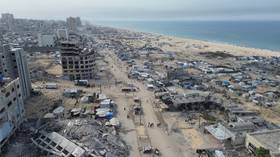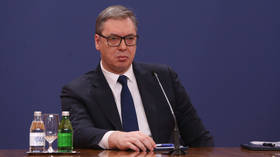US discusses ‘security interests’ with African state

US Deputy Secretary of State Christopher Landau has spoken with Malian Foreign Minister Abdoulaye Diop on “shared security interests” in the Sahel, where Western troops have been expelled over alleged failure to curb a long-running jihadist insurgency.
Landau said the discussions were held on Tuesday via a phone call, according to a post on X.
“I had an excellent conversation with Mali’s Foreign Minister Abdoulaye Diop to discuss our shared security interests in the region. Look forward to greater cooperation!” he wrote.
He added that the US “commends the armed forces of Mali in their fight against Islamic extremist militants” including Al-Qaeda-linked Jama’at Nusrat al-Islam wal-Muslimin (JNIM).
The armed group has recently imposed a blockade on fuel imports to the landlocked country and has reportedly attacked convoys of fuel tankers attempting to enter or reach the capital, Bamako.
The US commends the armed forces of Mali 🇲🇱 in their fight against Islamic extremist militants (JNIM). Today I had an excellent conversation with Mali’s Foreign Minister @AbdoulayeDiop8 to discuss our shared security interests in the region. Look forward to greater cooperation! pic.twitter.com/E3tge3sLnJ
— Christopher Landau (@DeputySecState) November 4, 2025
The West African nation has been embroiled in deadly jihadist violence since 2012, with Tuareg rebels and allied Islamist groups launching repeated attacks in the country’s north. The insurgency later spilled over into neighboring Burkina Faso and Niger, prompting Western military interventions.
However, the military governments in Mali, followed by allies in Burkina Faso and Niger, expelled French forces after years of joint operations, arguing that their engagement had failed to halt the attacks.
Since 2020, a wave of military coups has reshaped politics across the Sahel region in Africa, toppling civilian governments in Mali, Burkina Faso, and Niger.
France, once the region’s dominant external power, has steadily lost influence amid rising anti-French sentiment and deep frustration over insecurity, economic stagnation, and foreign interference. The former colonial power was forced to withdraw troops from Mali in 2022, Burkina Faso in 2023, Niger later that year, and Chad in early 2025.
About 4,500 soldiers had been deployed under Operation Barkhane, France’s largest overseas mission, across Mali, Burkina Faso, Niger, and Chad – a campaign that the military governments in Bamako, Niamey, and Ouagadougou have said only permitted Islamist insurgents to expand their activities.
The three West African states have established the Alliance of Sahel States (AES) and withdrawn from the International Organization of Francophone Nations (OIF) operating in Francophone countries, many of them former French colonies. The AES has forged new alliances, including with Russia, which its leaders hail as a more reliable economic and security partner.
In September 2024, the US withdrew assets and forces from a $100-million base in Niger after the government in Niamey terminated a defense agreement that had allowed 1,000 American soldiers and civilian contractors to operate in the country for over a decade. The former French colony cited the failures of the contingent and accused the US of attempting to dictate Niger’s choice of allies.
Washington had relied on Niger as a key location for counterterrorism operations in the Sahel, including monitoring the activities of jihadist groups. The Pentagon also pulled personnel from its only military site in Chad in April 2024, following a request from Chadian authorities for their departure.
Earlier this year, US Africa Command (AFRICOM) chief General Michael Langley told reporters in Kenya that the unit is reassessing its presence on the continent amid its declining influence.












